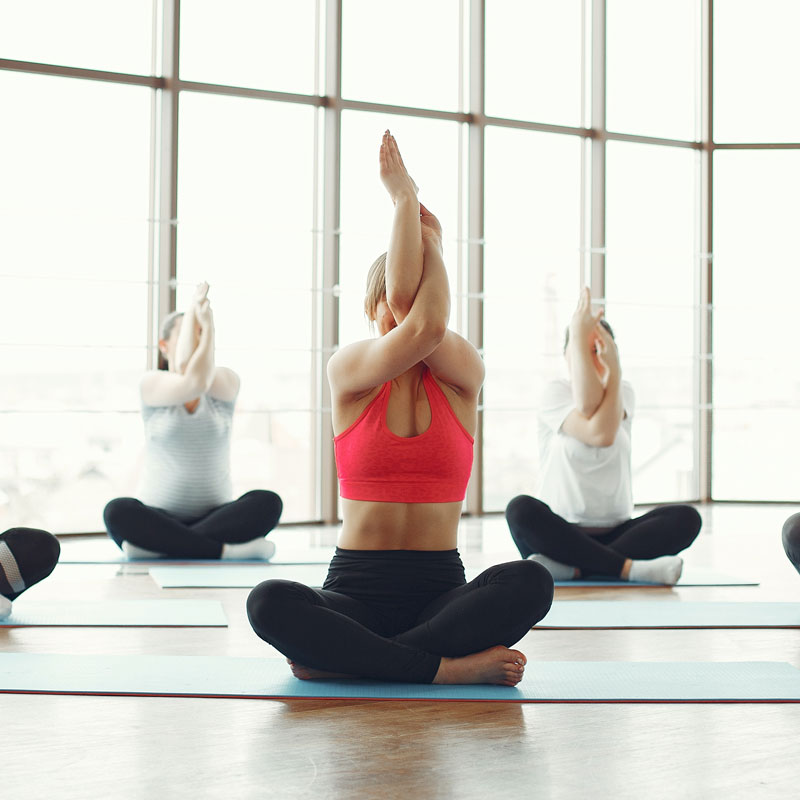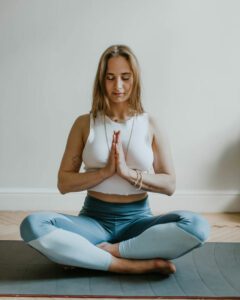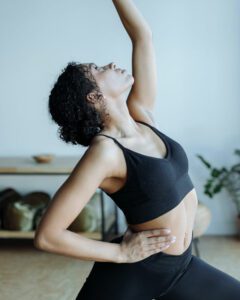Common Mistakes to Avoid in Beginner's Yoga

In the pursuit of mastering beginner yoga, one must navigate the treacherous path of common mistakes that often hinder progress. As the saying goes, ‘a journey of a thousand miles begins with a single step,’ so too does the journey into the world of yoga.
This article aims to shed light on the Yoga errors that beginners often encounter, offering valuable insights for those seeking mastery in their practice.
Through a knowledgeable and experienced lens, this piece will explore the importance of proper alignment and posture. It will look into how incorrect alignment can lead to injuries and prevent the full benefits of each pose.
Key Takeaways
- *Self-compassion and acceptance are crucial in beginners’ yoga, as they cultivate personal growth and create a solid foundation for progress.
- *Neglecting rest and recovery can lead to an increased risk of injury and hinder overall progress in beginners’ yoga.
- *Seeking professional guidance and instruction ensures a safe and effective practice, as incorrect poses and a lack of modifications can cause injuries or ineffective results.
- *Restorative poses and mindfulness practice are beneficial in beginners’ yoga, as they promote relaxation and rejuvenation, and enhance physical and mental recovery.
Proper Alignment and Posture
Proper alignment and posture are crucial aspects to consider in beginner yoga, ensuring a safe and effective experience. Achieving correct alignment helps in improving balance and prevents injuries.
In yoga, alignment refers to the positioning of the body parts in relation to each other and to the ground. One of the common mistakes new yogis make during yoga practice.
When practicing asanas, or yoga postures, it is essential to align the body properly to maintain stability and avoid strain on the muscles and joints. Incorrect alignment can lead to imbalances, which may result in discomfort or injury.
Breathing Techniques
A fundamental aspect of yoga practice involves applying specific breathing techniques, which contribute to its overall effectiveness and promote a sense of calm and focus. Breath awareness is an integral part of yoga, as it helps practitioners connect their body and mind, enhancing the mind-body connection.
Pranayama techniques, or controlled breathing exercises, are commonly used in yoga to regulate and deepen the breath. These techniques can vary in complexity and intensity, but they all aim to bring balance and harmony to the body and mind.
By incorporating breath awareness and pranayama techniques into their practice, beginners can experience increased relaxation, improved concentration, and a deeper sense of self-awareness.
Developing a solid foundation in breathing techniques is crucial before moving on to more advanced yoga poses and sequences.
Overexertion and Pushing Too Hard

- *Respect your body’s limitations: Pushing too hard can strain muscles, ligaments, and joints, increasing the risk of injury. It is essential to honor and work within your current capabilities.
- *Focus on alignment: Proper alignment ensures that the body is positioned correctly, reducing the likelihood of strain or injury. Pay attention to the instructor’s cues and make adjustments as needed.
- *Use modifications: Beginners may find certain poses challenging, but forcing yourself into a pose without proper preparation can lead to injury. Utilize props and modifications to build strength and flexibility gradually.
- *Practice mindfulness: Be present in your practice and listen to your body’s signals. Modify or come out of the pose if something feels uncomfortable or painful. Trusting your intuition is crucial for injury prevention.
Lack of Consistency
One potential obstacle to achieving optimal results from yoga practice is the irregularity of one’s routine. This is one of the common beginner yoga pitfalls that yogis make. Consistency plays a crucial role in reaping the full benefits of yoga. Without consistent practice, it becomes challenging to progress and maintain the motivation to continue.
Regular yoga practice allows the body to adapt and build strength, flexibility, and balance over time. It also helps to develop mental focus and mindfulness. When individuals lack consistency, they may find it difficult to stay motivated and may not experience the same level of progress as those who maintain a regular practice.
Therefore, it is important to establish a consistent routine to enjoy yoga’s physical and mental benefits fully.
Comparing Yourself to Others
Embracing your own journey in yoga involves recognizing and accepting that everyone’s practice is unique and personal. It is important to resist the urge to compare oneself to others to cultivate a mindset of self-compassion and acceptance.
Embracing Your Journey in Yoga
To appreciate the transformative power of yoga fully, it is crucial to acknowledge and honor the unique path that each individual embarks upon. Finding your own style and embracing your own journey in yoga is an essential aspect of personal growth and development.
When you allow yourself to explore different styles and approaches to yoga, you open yourself up to a world of possibilities and opportunities for self-discovery. A personal practice allows you to tailor your yoga experience to your specific needs and goals, whether it be for physical fitness, mental clarity, or spiritual connection.
It encourages self-reflection and self-awareness, as you learn to listen to your body and honor its limitations and strengths. By embracing your own journey in yoga, you can cultivate a deeper sense of self-acceptance and self-love, which is essential for personal growth and transformation.
How to Overcome the Urge to Compare
Comparing oneself to others in the realm of yoga is akin to comparing apples to oranges, as each individual’s practice is as unique as a fingerprint and should not be measured against another’s. Yoga is a personal journey that allows individuals to connect with their bodies, minds, and spirits in a deeply personal and transformative way.
Overcoming the urge to compare is essential in building self-confidence and overcoming self-doubt. When we constantly compare ourselves to others, we undermine our own progress and hinder our ability to embrace the practice fully. Instead, it is important to focus on our own growth and development, celebrating our achievements and recognizing that each person’s journey is different.
Cultivating a Mindset of Self-Compassion and Acceptance

To further illustrate the importance of self-compassion and acceptance, a comparison between self-criticism and self-compassion can be made:
Self-Criticism | Self-Compassion |
Focuses on flaws and shortcomings, | Embraces imperfections, and recognizes effort |
Creates feelings of inadequacy | Cultivates a sense of self-worth and resilience |
Hinders growth and learning | Encourages growth and learning |
Neglecting Rest and Recovery
Rest and recovery are often overlooked by beginners in their yoga practice, which can hinder their progress and increase the risk of injury.
It is crucial for beginners to understand the importance of incorporating restorative poses and allowing their bodies to recover to maximize their practice’s benefits.
To underscore the significance of rest and recovery, consider these three points:
- 1) Restorative poses: Engaging in restorative poses allows the body to relax and rejuvenate. These poses help to release tension, improve flexibility, and promote a sense of calm and well-being.
- 2) Physical and mental recovery: Rest and recovery are essential for physical healing and mental rejuvenation. Yoga can be physically and mentally demanding, and rest allows the mind and body to recharge.
- 3) Injury prevention: Neglecting rest and recovery increases the risk of injury. Pushing the body too hard without adequate rest can lead to overuse injuries and burnout. Taking breaks and allowing the body to recover helps to prevent such injuries.
Not Seeking Guidance or Instruction
Failing to seek guidance or instruction in yoga can be likened to embarking on a treacherous journey without a map or compass. Seeking professional help and guidance is crucial for beginners to avoid common mistakes and ensure a safe and effective practice.
Individuals may perform poses incorrectly without proper guidance, leading to injuries or ineffective results. Additionally, seeking instruction allows beginners to learn modifications tailored to their needs and limitations.
Modifications are essential in yoga, as they help individuals gradually build strength, flexibility, and balance while preventing strain or injury. A knowledgeable instructor can provide personalized guidance and modifications, ensuring beginners progress safely and effectively.
Mistake | Consequence | Solution |
Performing poses incorrectly | Injuries or ineffective results | Seek professional help and guidance |
Neglecting modifications | Strain or injury | Embrace modifications tailored to one’s needs |
Lack of personalized guidance | Slow progress or improper technique | Consult a knowledgeable instructor for personalized guidance |
Conclusion
Beginners in yoga must avoid common mistakes that can hinder their progress and potential for growth. By focusing on proper alignment and posture, mastering breathing techniques, avoiding overexertion, and maintaining consistency, individuals can experience the full benefits of yoga.
It is also important to remember not to compare oneself to others and to prioritize rest and recovery. Seeking guidance and instruction is essential in order to establish a strong foundation and avoid potential injuries.
As the saying goes, ‘Rome wasn’t built in a day,’ so patience and dedication are key in the journey of yoga.
Classes By Location
Mandarin
Sun Power
Sun Power Bhakti
Mind Body
Restorative
Yin Yoga
Sunrise Slow Flow
Yogalates
CPF
Sun Power Flow
Fleming Island
Sun Power
Mind Body
Hot Flow Yin
Yin Yoga
Yoga Sculpt
Mixed level
Candle Light Chill-asana
Mindful Slow Flow
Yin and Nidra
Sun Power Flow
Avondale
Sun Power
Mind Body
Hot Flow Yin
Power Yoga
Mixed Level
Yoga With Weights
Yin Yoga
Restorative
Brewery Yoga
Memorial Park Yoga
World Golf Village
Sun Power
Mind Body
Yin Yoga
Sun Power Flow
Mindful Flow
Sunrise Yoga
Yoga Sculpt
Cool Power
Bhakti
Vinyasa FlowYoga HIIT (high-intensity interval training)
San Pablo
Sun Power
Mind Body
Yin Yoga
Ab Yoga
Sculpt & Flow
Restorative
Prenatal
Hot Flow Yin
Shoppes of Bayard
Sun Power
Bhakti
Mind Body
Mindful Flow
Crossroads
Sun Power
Bhakti
Mind Body
Cardio Sculpt
Cool Power
Vinyasa Flow
Yin Yoga
Restorative
Yoga Stretch
Gentle Flow
Heated Stretch
Beach Yoga
Oakleaf
Sun Power Flow
Gentle Release
Mind Body
Hot Flow Yin
Yin Yoga
Yoga Nidra
Cool Power
Yoga Mix
Sun Power
Yoga HIIT (high-intensity interval training)
Yoga Sculpt
Mixed level
Restorative
Core Yoga (ab yoga)
Prana Magic
Yellow Bluff
Ashtanga Yoga
Sun Power
Sun Power Flow
Mind & Body
Bone Builder Yoga
Sculpt and Flow
Stretch Soothe and Strengthen
Yin Yoga



